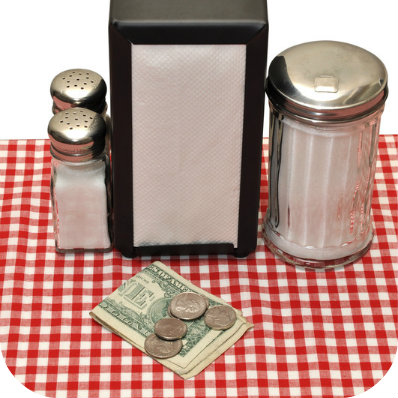餐業小費稅務問題

在餐館業打工的朋友,可能會有小費收入,不論是客人直接給的小費,或餐館將小費集中後派發,甚至由其他員工的小費中分出來給您,全部都是要報稅的收入。
員工最起碼應該自己每天記下小費金額,萬一被稅局查稅時便不用害怕。國稅局有一個表格,編號是4070A,是記錄收入的好工具。要取得這個表格,可以向雇主或國稅局辦事處取一份1244號刊物,裡面有可用一年的記錄表格。
國稅局亦規定,只要您一個月內的小費收入超過二十元,便要透過4070表格匯報雇主,原因是雇主需要將這些小費加在收入內,並扣除各項稅金,包括社會安全稅和收入稅。假如工資不足夠付扣除的稅金,員工可能要支付現金給雇主來繳納稅金。
雇主每年一月份要向您發出一份W-2表格,上面包括普通收入及小費收入,這些收入都是要填上報稅表。即使雇主沒有發出W-2(例如﹕餐館不再存在),員工亦一樣要憑本身收入記錄去報稅。
有時雇主在您呈報的小費收入外,再加上額外的小費收入,在W-2表格上放在第八項,這種收入稱為「分配小費」。為什麼會有這些額外的小費呢?原來國稅局規定,全部員工的小費加起來,必須超過餐館營業金額(外賣不算)的8%。不足的金額,便要硬性「分配」給每個員工,這金額是您收入的一部分,報稅時千萬不要漏填。 (转自林修榮理財
員工最起碼應該自己每天記下小費金額,萬一被稅局查稅時便不用害怕。國稅局有一個表格,編號是4070A,是記錄收入的好工具。要取得這個表格,可以向雇主或國稅局辦事處取一份1244號刊物,裡面有可用一年的記錄表格。
國稅局亦規定,只要您一個月內的小費收入超過二十元,便要透過4070表格匯報雇主,原因是雇主需要將這些小費加在收入內,並扣除各項稅金,包括社會安全稅和收入稅。假如工資不足夠付扣除的稅金,員工可能要支付現金給雇主來繳納稅金。
雇主每年一月份要向您發出一份W-2表格,上面包括普通收入及小費收入,這些收入都是要填上報稅表。即使雇主沒有發出W-2(例如﹕餐館不再存在),員工亦一樣要憑本身收入記錄去報稅。
有時雇主在您呈報的小費收入外,再加上額外的小費收入,在W-2表格上放在第八項,這種收入稱為「分配小費」。為什麼會有這些額外的小費呢?原來國稅局規定,全部員工的小費加起來,必須超過餐館營業金額(外賣不算)的8%。不足的金額,便要硬性「分配」給每個員工,這金額是您收入的一部分,報稅時千萬不要漏填。 (转自林修榮理財

出「現金糧」不合法
許多餐館業人士喜歡出「現金糧」,即將部份工資以現金支付,有時是員工主動要求,也有更多時候是餐館老板提出這樣做,目的是要減少稅款 -- 不單是雇主要為員工付出的社會安全稅、失業保險稅和因工受傷保費等,員工也減少要保稅的收入,表面是一家便宜兩家著,其實是個極不聰明的做法。
第一個問題,是隱瞞收入和逃稅乃屬不合法的行為。美國稅制是基於「自發性」,即國稅局不告訴您應報稅的收入金額,而是由納稅人自行申報,但這不等于政府讓您喜歡報多少便多少,故意漏報收入是犯法行為,一旦被被發覺便可能會被起訴。 其次,少報收入讓您和雇主減少社會安全稅,但將來退休金也相應減少。此外,當您要購買房子,申請貸款時候收入太少,貸款金額也減少。
當然,萬一您要申請失業金或傷殘賠償,由於您的收入少報了,得到的金額也會減少。
(转自林修榮理財)
許多餐館業人士喜歡出「現金糧」,即將部份工資以現金支付,有時是員工主動要求,也有更多時候是餐館老板提出這樣做,目的是要減少稅款 -- 不單是雇主要為員工付出的社會安全稅、失業保險稅和因工受傷保費等,員工也減少要保稅的收入,表面是一家便宜兩家著,其實是個極不聰明的做法。
第一個問題,是隱瞞收入和逃稅乃屬不合法的行為。美國稅制是基於「自發性」,即國稅局不告訴您應報稅的收入金額,而是由納稅人自行申報,但這不等于政府讓您喜歡報多少便多少,故意漏報收入是犯法行為,一旦被被發覺便可能會被起訴。 其次,少報收入讓您和雇主減少社會安全稅,但將來退休金也相應減少。此外,當您要購買房子,申請貸款時候收入太少,貸款金額也減少。
當然,萬一您要申請失業金或傷殘賠償,由於您的收入少報了,得到的金額也會減少。
(转自林修榮理財)

Tips and gratuities
Labor Code Section 351 prohibits employers and their agents from sharing in or keeping any portion of a gratuity left for or given to one or more employees by a patron. Furthermore it is illegal for employers to make wage deductions from gratuities, or from using gratuities as direct or indirect credits against an employee’s wages. The law further states that gratuities are the sole property of the employee or employees to whom they are given. "Gratuity" is defined in the Labor Code as a tip, gratuity, or money that has been paid or given to or left for an employee by a patron of a business over and above the actual amount due for services rendered or for goods, food, drink, articles sold or served to patrons. It also includes any amount paid directly by a patron to a dancer covered by IWC Wage Order 5 or 10.
1.Q.What is a tip?
A.A tip is money a customer leaves for an employee over the amount due for the goods sold or services rendered. Tips belong to the employee, not to the employer.
2.Q.When a customer pays their bill with a credit card and the payment includes a tip, when can the employee expect to receive the money from the employer?
A.Payment of a gratuity made by a patron using a credit card must be paid to the employee not later than the next regular payday following the date the patron authorized the credit card payment. Labor Code Section 351
3.Q.My employer is deducting the credit card processing fees from my tips. Is this legal?
A.No. Labor Code Section 351 provides that the employer must pay the employee the full amount of the tip that is indicated on the credit card. The employer may not make any deduction for credit card processing fees or costs that are charged to the employer by the credit card company from gratuities paid to the employee.
4.Q.I work in a large restaurant as a waiter. My employer told me that I am required to share my tips with the busboy and the bartender. Am I obligated to do this?
A.Yes. According to a California court, Labor Code Section 351 allows involuntary tip pooling. Therefore, your employer can require that you share your tips with other staff that provide service in the restaurant. In this regard, it’s DLSE’s position that when a tip pooling arrangement is in effect, the tips are to be distributed among the employees who provide "direct table service." Such employees could conceivably include waiters and waitresses, busboys, bartenders, host/hostesses and maitre d’s. Employees who do not provide direct table service and who do not share in the tip pool include dishwashers, cooks, and chefs, except in restaurants where the chefs prepare the food at the patron’s table, in which case the chef may participate in the tip pool. Additionally, tip pooling cannot be used to compensate the owner(s), manager(s), or supervisor(s) of the business, even if these individuals should provide direct table service to a patron.
5.Q.Are the tips I receive considered part of my "regular rate of pay" for overtime calculations?
A.No. Since tips are voluntarily left for you by the customer of the business and are not being provided by the employer, they are not considered as part of your regular rate of pay when calculating overtime.
6.Q.Is a mandatory service charge considered to be the same as a tip or gratuity?
A.No, a tip is a voluntary amount left by a patron for an employee. A mandatory service charge is an amount that a patron is required to pay based on a contractual agreement or a specified required service amount listed on the menu of an establishment. An example of a mandatory service charge that is a contractual agreement would be a 10 or 15 percent charge added to the cost of a banquet. Such charges are considered as amounts owed by the patron to the establishment and are not gratuities voluntarily left for the employees. Therefore, when an employer distributes all or part of a service charge to its employees, the distribution may be at the discretion of the employer and the service charge, which would be in the nature of a bonus, would be included in the regular rate of pay when calculating overtime payments.
7.Q.My employer deducts my tips from my paycheck. Is this legal?
A.No. Your employer can neither take your tips (or any part of them), nor deduct money from your wages because of the tips you earn. Furthermore, your employer cannot credit your tips against the money the employer owes you. Labor Code Section 351
8.Q.My employer pays me less than the minimum wage because he includes my tips in my hourly pay. Is this legal?
A.No. Unlike under federal regulations, in California an employer cannot use an employee’s tips as a credit towards its obligation to pay the minimum wage. California law requires that employees receive the minimum wage plus any tips left for them by patrons of the employer’s business. Labor Code Section 351
9.Q.What can I do if my employer credits my tips against my wages?
A.You can either file a wage claim with the Division of Labor Standards Enforcement (the Labor Commissioner’s Office), or you can file a lawsuit in court against your employer in to recover the lost wages. Additionally, if your employer is crediting your tips against your wages, you are being underpaid your wages and thus, if you no longer work for this employer, you can make a claim for the waiting time penalty.
10.Q.What is the procedure that is followed after I file a wage claim?
A.After your claim is completed and filed with a local office of the Division of Labor Standards Enforcement (DLSE), it will be assigned to a Deputy Labor Commissioner who will determine, based upon the circumstances of the claim and information presented, how best to proceed. Initial action taken regarding the claim can be (i) referral to a conference, (ii) referral to a hearing, or (iii) dismissal of the claim.
If the decision is to hold a conference, the parties will be notified by mail of the date, time and place of the conference. The purpose of the conference is to determine the validity of the claim, and to see if the claim can be resolved without a hearing. If the claim is not resolved at the conference, the next step usually is to refer the matter to a hearing or dismiss it for lack of evidence.
At the hearing the parties and witnesses testify under oath, and the proceeding is recorded. After the hearing, an Order, Decision, or Award (ODA) of the Labor Commissioner will be served on the parties.
Either party may appeal the ODA to a civil court of competent jurisdiction. The court will set the matter for trial, with each party having the opportunity to present evidence and witnesses. The evidence and testimony presented at the Labor Commissioner’s hearing will not be the basis for the court’s decision. In the case of an appeal by the employer, DLSE may represent an employee who is financially unable to afford counsel in the court proceeding.
See the Policies and Procedures for Wage Claim Processing pamphlet for more detail on the wage claim procedure.
11.Q.What can I do if I prevail at the hearing and the employer doesn’t pay or appeal the Order, Decision, or Award?
A.When the Order, Decision, or Award (ODA) is in the employee's favor and there is no appeal, and the employer does not pay the ODA, the Division of Labor Standards Enforcement (DLSE) will have the court enter the ODA as a judgment against the employer. This judgment has the same force and effect as any other money judgment entered by the court. Consequently, you may either try to collect the judgment yourself or you can assign it to DLSE.
12.Q.What can I do if my employer retaliates against me because I objected to his crediting my tips against my wages?
A.If your employer discriminates or retaliates against you in any manner whatsoever, for example, he discharges you because you object to his crediting your tips against your wages, or because you file a claim or threaten to file a claim with the Labor Commissioner, you can file a discrimination/retaliation complaint with the Labor Commissioner’s Office. In the alternative, you can file a lawsuit in court against your employer.
Labor Code Section 351 prohibits employers and their agents from sharing in or keeping any portion of a gratuity left for or given to one or more employees by a patron. Furthermore it is illegal for employers to make wage deductions from gratuities, or from using gratuities as direct or indirect credits against an employee’s wages. The law further states that gratuities are the sole property of the employee or employees to whom they are given. "Gratuity" is defined in the Labor Code as a tip, gratuity, or money that has been paid or given to or left for an employee by a patron of a business over and above the actual amount due for services rendered or for goods, food, drink, articles sold or served to patrons. It also includes any amount paid directly by a patron to a dancer covered by IWC Wage Order 5 or 10.
1.Q.What is a tip?
A.A tip is money a customer leaves for an employee over the amount due for the goods sold or services rendered. Tips belong to the employee, not to the employer.
2.Q.When a customer pays their bill with a credit card and the payment includes a tip, when can the employee expect to receive the money from the employer?
A.Payment of a gratuity made by a patron using a credit card must be paid to the employee not later than the next regular payday following the date the patron authorized the credit card payment. Labor Code Section 351
3.Q.My employer is deducting the credit card processing fees from my tips. Is this legal?
A.No. Labor Code Section 351 provides that the employer must pay the employee the full amount of the tip that is indicated on the credit card. The employer may not make any deduction for credit card processing fees or costs that are charged to the employer by the credit card company from gratuities paid to the employee.
4.Q.I work in a large restaurant as a waiter. My employer told me that I am required to share my tips with the busboy and the bartender. Am I obligated to do this?
A.Yes. According to a California court, Labor Code Section 351 allows involuntary tip pooling. Therefore, your employer can require that you share your tips with other staff that provide service in the restaurant. In this regard, it’s DLSE’s position that when a tip pooling arrangement is in effect, the tips are to be distributed among the employees who provide "direct table service." Such employees could conceivably include waiters and waitresses, busboys, bartenders, host/hostesses and maitre d’s. Employees who do not provide direct table service and who do not share in the tip pool include dishwashers, cooks, and chefs, except in restaurants where the chefs prepare the food at the patron’s table, in which case the chef may participate in the tip pool. Additionally, tip pooling cannot be used to compensate the owner(s), manager(s), or supervisor(s) of the business, even if these individuals should provide direct table service to a patron.
5.Q.Are the tips I receive considered part of my "regular rate of pay" for overtime calculations?
A.No. Since tips are voluntarily left for you by the customer of the business and are not being provided by the employer, they are not considered as part of your regular rate of pay when calculating overtime.
6.Q.Is a mandatory service charge considered to be the same as a tip or gratuity?
A.No, a tip is a voluntary amount left by a patron for an employee. A mandatory service charge is an amount that a patron is required to pay based on a contractual agreement or a specified required service amount listed on the menu of an establishment. An example of a mandatory service charge that is a contractual agreement would be a 10 or 15 percent charge added to the cost of a banquet. Such charges are considered as amounts owed by the patron to the establishment and are not gratuities voluntarily left for the employees. Therefore, when an employer distributes all or part of a service charge to its employees, the distribution may be at the discretion of the employer and the service charge, which would be in the nature of a bonus, would be included in the regular rate of pay when calculating overtime payments.
7.Q.My employer deducts my tips from my paycheck. Is this legal?
A.No. Your employer can neither take your tips (or any part of them), nor deduct money from your wages because of the tips you earn. Furthermore, your employer cannot credit your tips against the money the employer owes you. Labor Code Section 351
8.Q.My employer pays me less than the minimum wage because he includes my tips in my hourly pay. Is this legal?
A.No. Unlike under federal regulations, in California an employer cannot use an employee’s tips as a credit towards its obligation to pay the minimum wage. California law requires that employees receive the minimum wage plus any tips left for them by patrons of the employer’s business. Labor Code Section 351
9.Q.What can I do if my employer credits my tips against my wages?
A.You can either file a wage claim with the Division of Labor Standards Enforcement (the Labor Commissioner’s Office), or you can file a lawsuit in court against your employer in to recover the lost wages. Additionally, if your employer is crediting your tips against your wages, you are being underpaid your wages and thus, if you no longer work for this employer, you can make a claim for the waiting time penalty.
10.Q.What is the procedure that is followed after I file a wage claim?
A.After your claim is completed and filed with a local office of the Division of Labor Standards Enforcement (DLSE), it will be assigned to a Deputy Labor Commissioner who will determine, based upon the circumstances of the claim and information presented, how best to proceed. Initial action taken regarding the claim can be (i) referral to a conference, (ii) referral to a hearing, or (iii) dismissal of the claim.
If the decision is to hold a conference, the parties will be notified by mail of the date, time and place of the conference. The purpose of the conference is to determine the validity of the claim, and to see if the claim can be resolved without a hearing. If the claim is not resolved at the conference, the next step usually is to refer the matter to a hearing or dismiss it for lack of evidence.
At the hearing the parties and witnesses testify under oath, and the proceeding is recorded. After the hearing, an Order, Decision, or Award (ODA) of the Labor Commissioner will be served on the parties.
Either party may appeal the ODA to a civil court of competent jurisdiction. The court will set the matter for trial, with each party having the opportunity to present evidence and witnesses. The evidence and testimony presented at the Labor Commissioner’s hearing will not be the basis for the court’s decision. In the case of an appeal by the employer, DLSE may represent an employee who is financially unable to afford counsel in the court proceeding.
See the Policies and Procedures for Wage Claim Processing pamphlet for more detail on the wage claim procedure.
11.Q.What can I do if I prevail at the hearing and the employer doesn’t pay or appeal the Order, Decision, or Award?
A.When the Order, Decision, or Award (ODA) is in the employee's favor and there is no appeal, and the employer does not pay the ODA, the Division of Labor Standards Enforcement (DLSE) will have the court enter the ODA as a judgment against the employer. This judgment has the same force and effect as any other money judgment entered by the court. Consequently, you may either try to collect the judgment yourself or you can assign it to DLSE.
12.Q.What can I do if my employer retaliates against me because I objected to his crediting my tips against my wages?
A.If your employer discriminates or retaliates against you in any manner whatsoever, for example, he discharges you because you object to his crediting your tips against your wages, or because you file a claim or threaten to file a claim with the Labor Commissioner, you can file a discrimination/retaliation complaint with the Labor Commissioner’s Office. In the alternative, you can file a lawsuit in court against your employer.

|
鴻博會計師事務所
1045 E. Valley Blvd. A112 San Gabriel, CA 91776 USA 電話: 626-692-5678 傳真: (888)299-6858 電郵: [email protected] |
Copyright © 2015
